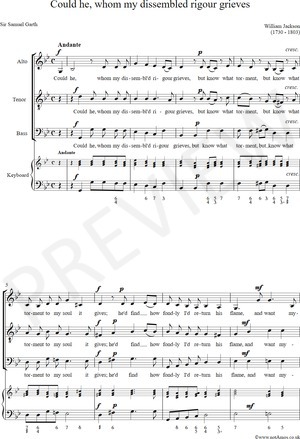 notAmos Performing Editions 1 Lansdown Place East, Bath BA1 5ET, UK +44 (0) 1225 316145 Performing editions of pre‑classical music with full preview/playback and instant download |
William Jackson (of Exeter)
(1730 - 1803)

Could he, whom my dissembled rigour grieves
(A.T.B.Continuo)
Score, part(s) and cover page (PDF), €0.00 for bundled copies Download this item(1730 - 1803)

Could he, whom my dissembled rigour grieves
(A.T.B.Continuo)
If you have any problem obtaining a PDF, please see our help page. If that does not resolve the issue, please click here.
Click on the illustration to display a larger version

This work, Jackson (of Exeter) : Could he, whom my dissembled rigour grieves : scoreid 148240, as published by notAmos Performing Editions, is licensed under a Creative Commons Attribution-ShareAlike 4.0 International License. All relevant attributions should state its URL as https://www.notamos.co.uk/detail.php?scoreid=148240. Permissions beyond the scope of this licence may be available at https://www.notamos.co.uk/index.php?sheet=about.
| Enquire about this score |
| About William Jackson |
| Full Catalogue |
| About us | Help, privacy, cookies |
| About William Jackson |
| Full Catalogue |
| About us | Help, privacy, cookies |
Elegy III from Jackson's Elegies, Op. 3, 1762.
In his frontispiece, Jackson specified performance in the following terms: "I would just observe, that the following pieces will lose their effect, when the parts are doubled. The manner of performance that I would recommend, is by three voices singing moderately soft, and accompanied with any bass instrument that may have the effect of an accompaniment only; for nothing hurts a piece so much, as making a part principal, or even equal with others, when it was intended to be subservient. The equality of strength among the voices should also be observed; if one voice of the three be strong, and the others weak, it is necessary to soften it down, that the balance may not be destroyed; for it should always be remembered, that as no principal part was intended, there must be none produced".
In his frontispiece, Jackson specified performance in the following terms: "I would just observe, that the following pieces will lose their effect, when the parts are doubled. The manner of performance that I would recommend, is by three voices singing moderately soft, and accompanied with any bass instrument that may have the effect of an accompaniment only; for nothing hurts a piece so much, as making a part principal, or even equal with others, when it was intended to be subservient. The equality of strength among the voices should also be observed; if one voice of the three be strong, and the others weak, it is necessary to soften it down, that the balance may not be destroyed; for it should always be remembered, that as no principal part was intended, there must be none produced".
Lyrics: Sir Samuel Garth
Could he, whom my dissembled rigour grieves,
But know what torment to my soul it gives;
He'd find how fondly I'd return his flame,
And want myself the pity he would claim.
Unhappy partner of my killing pain,
Think what I feel the moment you complain.
Each sigh you utter wounds my tend'rest part,
So much my words misrepresent my heart.
When from your eyes the falling drops distil,
My vital blood in ev'ry tear you spill:
And all those mournful agonies I hear
Are but the echoes of my own despair.
Could he, whom my dissembled rigour grieves,
But know what torment to my soul it gives;
He'd find how fondly I'd return his flame,
And want myself the pity he would claim.
Unhappy partner of my killing pain,
Think what I feel the moment you complain.
Each sigh you utter wounds my tend'rest part,
So much my words misrepresent my heart.
When from your eyes the falling drops distil,
My vital blood in ev'ry tear you spill:
And all those mournful agonies I hear
Are but the echoes of my own despair.
